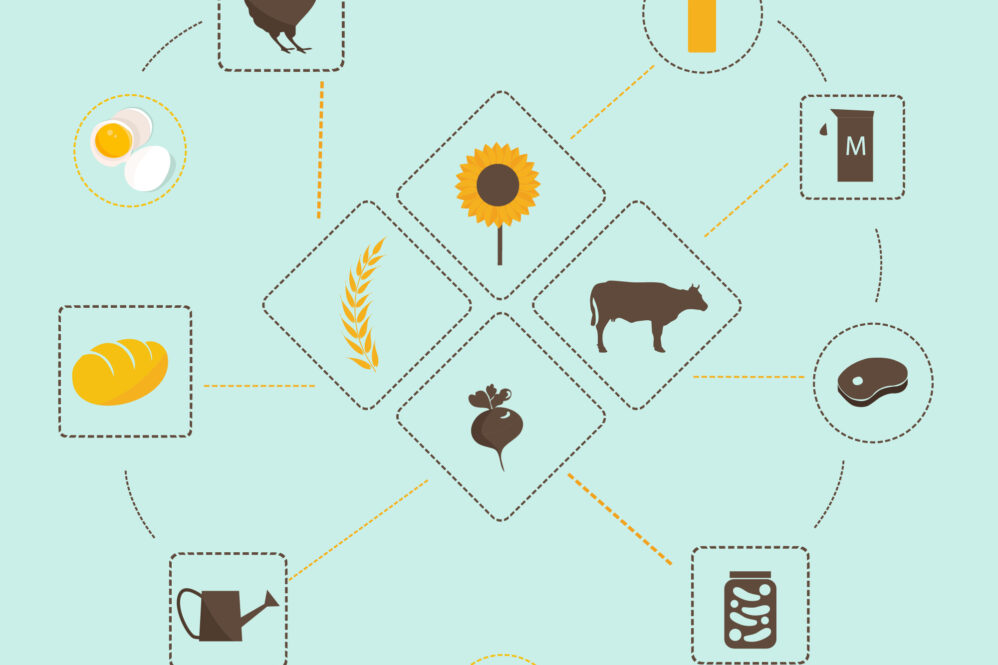Nigeria’s agriculture industry is regarded as a significant sector with tremendous potential for domestic and international investment. According to the National Bureau of Statistics, Agriculture contributed around 21.96% of the country’s GDP in the fourth quarter of 2020. With a growing population and rising demand for food and other agricultural goods, investing in the value chain offers investors a once-in-a-lifetime chance to earn returns on investment.
From production to consumption, the agricultural value chain refers to the complete process of producing, processing, marketing, and distributing Agricultural goods. Investing in the agricultural value chain opens up different options, including farming and production, agro-processing, marketing, and distribution.
This blog article will showcase five profitable investment options in Nigeria’s agriculture value chain. These opportunities cover a range of sectors, from agricultural technology to renewable energy, and are designed to assist investors in identifying viable investment opportunities in the Nigerian agriculture industry. By the end of this post, you should better understand the potential for investment in the Nigerian agricultural value chain and how to take advantage of the various opportunities available. So, what are you waiting for? Let’s dive in
- Farming and Production
The farming and production sector of the agricultural value chain is one of the most critical and lucrative investment opportunities in Nigeria. With a population of over 200 million people and a growing demand for food and agro-based products, there is a huge market for farmers and agribusinesses who can produce high-quality crops and livestock.
Depending on their interests and finances, investors can explore different agricultural methods and production processes. Mechanized farming, for example, with tractors and other agricultural equipment, can increase efficiency and production, yet organic farming might appeal to customers who value health and sustainability.
Some specialized crops or products with significant demand and profitability in Nigeria include:
Rice: Nigeria is one of the world’s major importers of rice, creating an enormous potential for investors who can grow high-quality rice domestically. The government has also established programs to stimulate local rice production, such as the Anchor Borrowers’ Program, which gives farmers loans and other assistance.
Cassava: Cassava is a staple crop in Nigeria and can be processed into various products, such as flour, starch, and ethanol. Investors can explore opportunities in cassava farming and processing, especially in areas with favorable climatic conditions and market access.
Poultry: Poultry farming is another profitable venture in Nigeria, as chicken and eggs are popular protein sources. Investors can consider broiler, layer farming, hatchery, and processing facilities.
Investing in farming and production demands resources and knowledge and can bring in large profits. To thrive in this section of the agricultural value chain, investors need to perform extensive market research, understand the regulatory environment, and form solid connections with suppliers and customers.
- Marketing and Distribution
Marketing and distribution are important parts of the agricultural value chain because they link farmers and agribusinesses with consumers and other purchasers. Nigeria’s vast population and expanding middle class make it an appealing market for a variety of agricultural goods ranging from fresh produce to processed meals to animal products.
Here are some specific investment opportunities in the agricultural value chain’s marketing and distribution segment:
Wholesale markets: Wholesale markets are important distribution outlets for agricultural goods in Nigeria, with large marketplaces in Lagos, Kano, and Onitsha. Investors can look into possibilities in market infrastructure, logistics, market intelligence, and high-demand items like meat and dairy products, seafood, and fresh vegetables.
Retail outlets: Retail facilities, such as supermarkets, convenience stores, and specialty shops, provide another channel for agricultural product marketing and distribution in Nigeria. Investors can explore forming alliances with current retailers or establish their retail networks while emphasizing high-quality, specialized items that appeal to specific customer categories.
E-commerce platforms: As internet and smartphone penetration in Nigeria increases, e-commerce platforms are becoming more popular for purchasing and selling agricultural goods. Investors can look into building or collaborating with e-commerce platforms that specialize in Agricultural goods and logistics, payment, and customer support solutions.
Export markets: Nigerian agricultural goods have a high potential for export to regional and worldwide markets such as Europe, Asia, and the Middle East. Opportunities in export logistics, quality control, and marketing, as well as particular items with significant export potential, such as cocoa, cashew nuts, sesame seeds, and hibiscus, can be considered by investors.
Overall, the agricultural value chain’s marketing and distribution section provides diverse investment options that may capitalize on Nigeria’s rising population and broad customer demand. However, investors must be aware of the challenges and risks associated with this segment, such as poor infrastructure, inefficient supply chains, and regulatory barriers.
- Agricultural Technology
Agricultural technology, or agtech, is a new area that combines technology and creativity to increase agricultural efficiency, production, and sustainability. As the world’s population expands and food demand rises, agricultural technology (agtech) has emerged as a critical component of the Agricultural value chain, with the potential to alter how we produce, process, and distribute food.
The agtech industry in Nigeria is still in its early phases, but it has already shown hopeful indicators of development and influence. According to a research from World Bank, agtech has the potential to enhance agricultural production by 40% while reducing post-harvest losses by 50%. This creates a significant potential for investors interested in assisting with developing and implementing agtech solutions in Nigeria.
Here are some specific agtech areas that provide lucrative investment opportunities in Nigeria’s agricultural value chain:
Precision agriculture: This is an avant-garde and technology-driven method that integrates state-of-the-art instruments like sensors, unmanned aerial vehicles (UAVs), and Global Positioning System (GPS) to gather instantaneous data on soil, climatic conditions, and crop vitality. This data is subsequently utilized to make informed decisions regarding seeding, fertilization, irrigation, and harvesting, leading to maximized outputs, decreased waste, and refined crop excellence. To fortify the advancement of precision farming technology and amenities, in addition to allocating investments in precision agriculture enterprises, investors can provide crucial financing.
Irrigation: In Nigeria, where the insufficiency of water poses a significant hazard to agrarian productivity, irrigation is a fundamental feature of farming. By implementing advanced irrigation methods such as drip irrigation, spray systems, and water harvesting from rain, farmers can amplify crop yields while curbing water wastage. To reinforce the development of novel irrigation technology and systems, as well as making investments in irrigation service firms, investors can perform an indispensable role.
Farm management software: is a sort of technology that assists farmers in more successfully managing their operations by giving improved capabilities for record-keeping, inventory management, and data analysis. Farmers can make better choices, save expenses, and boost profitability by utilizing farm management software. Investors can give much-needed financial help by supporting the development of new software platforms and investing in organizations that supply farm management software.
Vertical farming: is a cutting-edge agricultural technique that includes growing crops in vertically stacked layers with enhanced lighting, temperature control, and hydroponic or aeroponic systems. Farmers can produce more food while using less area, water, and energy thereby lowering transportation costs and carbon emissions, by utilizing vertical farming methods. Investors can offer vital capital to assist in the construction and operation of vertical farms and invest in vertical farming firms.
Logistics and supply chain management: Logistics and supply chain management are key components of the agricultural value chain since they include the transportation, storage, and distribution of agricultural goods. Investing in technology like blockchain, GPS monitoring, and warehouse management systems can assist in enhancing the supply chain’s efficiency, and transparency and decrease waste and losses. Investors can help logistics and supply chain management by sponsoring the development of new technologies and systems and investing in logistics and supply chain management firms.
- Agro-processing and Packaging
The agro-processing and packaging segment of the agricultural value chain involves adding value to raw agricultural products by processing them into intermediate or final products and packaging them for sale and distribution. This segment offers numerous investment opportunities in Nigeria, as the country has a diverse range of agricultural products with high demand locally and internationally.
Fruits and vegetables: These are one sector where investment in agro-processing and packaging is focused. Tropical produce from Nigeria, including mangoes, pineapples, watermelons, tomatoes, and peppers, is renowned for its abundance and variety. These goods can be processed into several products with additional value, including juices, purees, dried fruits, and fruits and vegetables in cans. The quality and shelf life of these products can be preserved by investing in contemporary processing techniques like freeze-drying, vacuum packing, and aseptic packaging can expand their marketability locally and abroad.
Spices and grains: This is another sector where agro-processing and packaging investment is being prioritized. Nigeria is a major producer of grains and spices such as millet, ginger, garlic, and onions. These goods can be processed into different products with additional value, including flour, fast meals, and spice mixes. The safety, quality, and efficiency of these items can be improved by investing in quality control and packaging technologies like metal detectors, sieving equipment, and bulk bags, which can also be used to fulfill the various demands of clients in various markets.
- Renewable Energy In Agriculture
Agriculture is a sector with huge potential for clean energy investment as the globe continues to shift to renewable energy sources. Nigeria is hardly an exception, with its voluminous sunlight and wind. Investors can benefit financially and assist in sustainable development by funding agricultural renewable energy technologies.
In Nigeria, different renewable energy sources can be used to power agricultural activities.
Solar Power: Solar power is one of the most promising. Nigeria has a significant potential for solar energy generation due to its daily average of 6-7 hours of sunlight. To power irrigation systems, lights, and other equipment on farms, solar panels can be installed. This eliminates the need for expensive and unreliable diesel generators. Farmers may increase their income by preserving and adding value to their harvests using solar-powered cool rooms and processing facilities.
Wind Energy: Wind energy is another form of renewable energy that can help Nigerian agriculture. Coastal locations and high plateaus have a very high potential for wind power, while wind speeds vary throughout the nation. Wind turbines can pump water for irrigation or provide power for farms and adjacent cities.
Biomass energy: This is a practical alternative to solar and wind energy for Nigerian agricultural activities. Crop waste, animal waste, and wood chips are examples of biomass that can generate heat and power. In remote locations with limited access to pricey fossil fuels or grid energy, this form of energy can be helpful.
There are various options for investors to become engaged with renewable energy in agriculture. They may invest in renewable energy firms that focus on agriculture or they can fund the construction of solar cells, wind turbines, or biomass boilers on farms. Additionally, they can collaborate with neighborhood groups or communities to create renewable energy projects that benefit farmers and consumers.
Investors can contribute to sustainable development and mitigate climate change while taking advantage of a rising sector with great profit potential by investing in renewable energy for agriculture.
Conclusion
With everything said, it’s evident that the Nigerian agricultural value chain is ready for successful investment. There are various sectors where investors can have a huge effect while also making considerable rewards, ranging from farming and production to renewable energy and agrotech. The agriculture sector’s complexity and unpredictability may seem intimidating, but with the correct knowledge and skills, investors can traverse this environment and profit from its potential for development and innovation. Whether you are a local or international investor, the Nigerian agriculture industry is a viable investment location that may provide financial benefits and a beneficial social effect. So, why delay? Begin investigating these alternatives now to realize Nigeria’s full agricultural potential!












